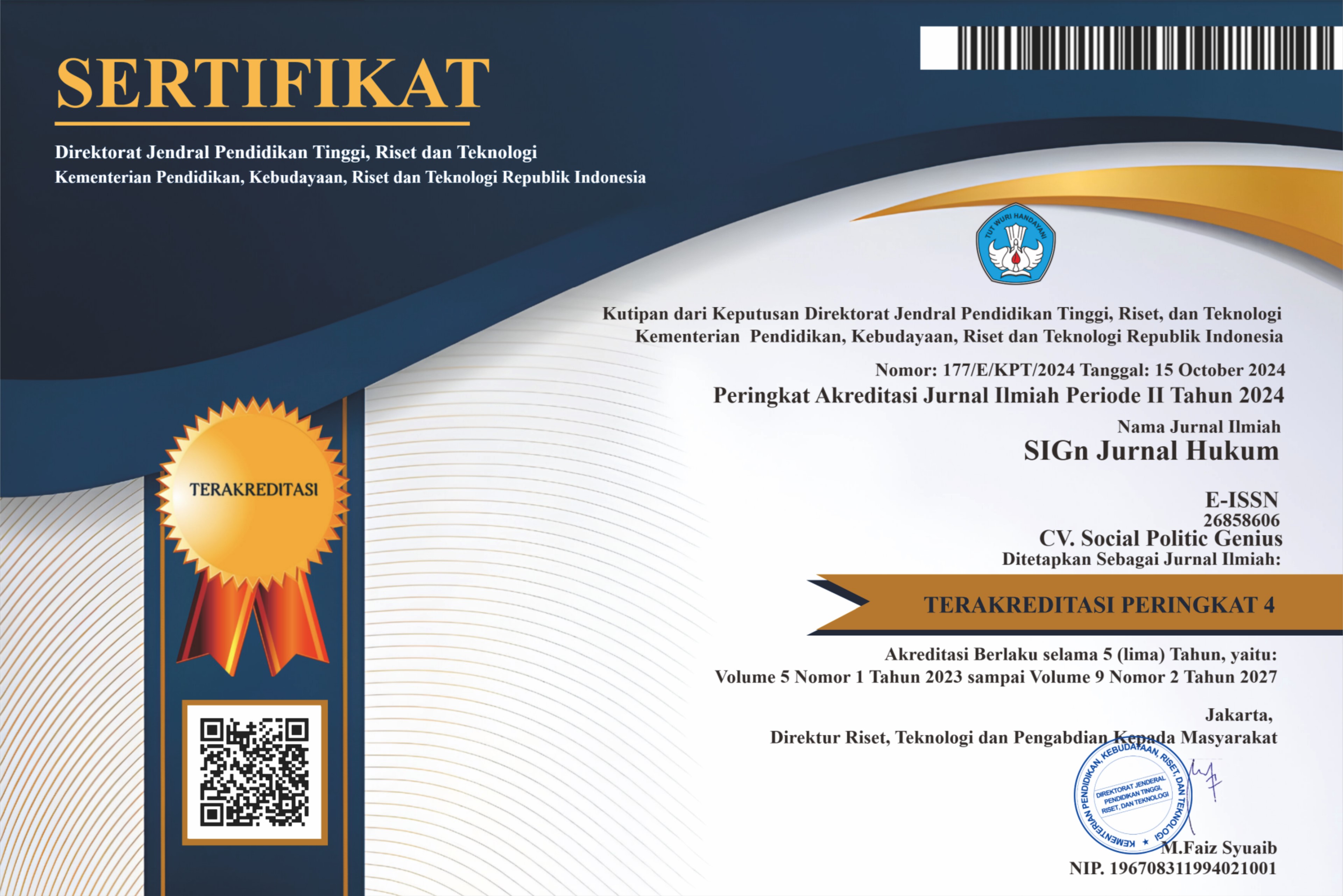The Position of Daughters in Sunni and Shia Inheritance Law: A Study of Justice and Implementation in West Nusa Tenggara
Abstract
Islamic inheritance law constitutes a paradigmatic arena of debate concerning gender justice. This debate primarily concerns the position of daughters, which differs fundamentally between the Sunni and Shia schools of thought. This study has three objectives: first, to comparatively analyze the position of daughters in the legal constructions of Sunni and Shia inheritance law; second, to map the implementation of this law within the landscape of legal pluralism in West Nusa Tenggara; and third, to evaluate the materialization of gender justice in prevailing practices. This study employs a mixed-methods design with a sequential explanatory strategy. It combines doctrinal analysis of primary jurisprudential texts, an examination of court decisions, in-depth interviews with judges and customary leaders, and a survey of 150 heads of households in three representative locations in West Nusa Tenggara. The results reveal three layers of conflict. First, a philosophical conflict between the principles of ‘aṣabah (Sunni) and qarābah (Shia). Second, a variation in implementation at the judicial level, ranging from rigid-formalistic to adaptive-collaborative, which is heavily influenced by the hegemony of patriarchal customary law. Third, a quantitatively measured gender justice deficit caused by the interaction among the formalism of state law (the Compilation of Islamic Law), the dominance of patriarchal culture, and low gender literacy. It is concluded that gender injustice in inheritance practices in West Nusa Tenggara is structural. This problem cannot be resolved merely through the reform of legal texts but requires a holistic approach that includes critical education and the strengthening of substantive justice mechanisms.
Downloads
References
Aditya, Z. F. (2019). Romantisme Sistem Hukum di Indonesia: Kajian Atas Konstribusi Hukum Adat dan Hukum Islam terhadap Pembangunan Hukum di Indonesia. Jurnal Rechts Vinding: Media Pembinaan Hukum Nasional, 8(1), 37-54. https://doi.org/10.33331/rechtsvinding.v8i1.305
Afifah, N. (2024). Mengkaji Ulang Stereotip Gender: Eksplorasi Stereotip Gender dalam Konteks Budaya Matrilineal Minangkabau. Jurnal Dinamika Sosial Budaya, 26(1), 93-104. https://doi.org/10.26623/jdsb.v26i1.9779
al-Haytami, I. H. (1971). Tuhfah al-Muhtaj bi Syarh al-Minhaj. Dar al-Kutub al-Ilmiyyah.
al-Najafi, M. H. (1984). Jawahir al-Kalam fi Syarh Syarai’ al-Islam. Dar Ihya al-Turath al-Arabi.
Azharuddin, A., Sarong, A. H., & Jauhari, I. (2015). Waris Islam di Indonesia. Jurnal Ilmu Hukum, 3(2), 19-26. Retrieved from https://jurnal.usk.ac.id/MIH/article/view/4767
Bachri, S. (2018). Pro Kontra ‘Aul dalam Kewarisan Islam: Studi Komparatif Antara Pandangan Sunni dan Syiah. De Jure: Jurnal Hukum dan Syar’iah, 10(2), 49-60. https://doi.org/10.18860/j-fsh.v10i2.6707
Elfia, E., Surwati, S., Nelli, F., & Fajri, Y. (2024). Gender Equality in Imamate Shia and Sunni Inheritance Jurisprudence: A Comparative Analysis of Legal Doctrines and Familial Relationships. Mazahib: Jurnal Pemikiran Hukum Islam, 23(2), 555-594. https://doi.org/10.21093/mj.v23i2.8381
Faisal, F., Bahar, M., & Elfia, E. (2021). Penerapan Asas Bilateral dalam Kewarisan Islam Menurut Ulama Sunni dan Syi’ah Imamiyyah. Jurnal Al-Ahkam, 12(2), 89-116. Retrieved from https://ejournal.uinib.ac.id/jurnal/index.php/alahkam/article/view/3617
Hanan, A. F., & Adly, M. A. (2023). Anak Perempuan Sebagai Penghijab Saudara Kandung Ayah (Analisis Terhadap Putusan Pengadilan Agama Medan Nomor 40/Pdt.P/2017/PA Medan). Jurnal Preferensi Hukum, 4(3), 321-328. Retrieved from https://ejurnal.warmadewa.ac.id/index.php/juprehum/article/view/8096
Irwansyah. (2020). Penelitian Hukum: Pilihan Metode & Praktik Penulisan Artikel. Mirra Buana Media.
Jalil, D. (2022). Penyimpangan Hukum Waris di Indonesia. Al-Mizan: Jurnal Hukum dan Ekonomi Islam, 6(1), 1-19. https://doi.org/10.33511/almizan.v6n1.1-19
Jauhari, I. (2016). Kedudukan dan Hak-Hak Anak Perempuan dalam Hukum Kewarisan Islam. Konfrontasi: Jurnal Kultural, Ekonomi dan Perubahan Sosial, 3(2), 9-17. Retrieved from https://www.konfrontasi.net/index.php/konfrontasi2/article/view/34
Laili, R. N., & Santoso, L. (2021). Analisis Penolakan Isbat Nikah Perspektif Studi Hukum Kritis. Al-Manhaj: Jurnal Hukum dan Pranata Sosial Islam, 3(1), 1-34. https://doi.org/10.37680/almanhaj.v3i1.566
Lajnah Pentashihan Mushaf Al-Qur’an. (2022). Qur’an Kemenag. Ministry of Religious Affairs of the Republic of Indonesia. https://quran.kemenag.go.id
Langford, M. (2024). Mixed Methods in Human Rights Research. In B. A. Andreassen et al. (Eds.), Research Methods in Human Rights: A Handbook (Second Edition, pp. 292-320). Edward Elgar Publishing. https://doi.org/10.4337/9781803922614.00028
Muhardinata, I. (2020). Perbedaan Pandangan dalam Pengembangan Ahli Waris Menurut Sunni, Syi’ah dan Hazairin. El-Ahli: Jurnal Hukum Keluarga Islam, 1(1), 68-87. https://doi.org/10.56874/el-ahli.v1i1.89
Presidential Instruction of the Republic of Indonesia Number 1 of 1991 on Spread of the Compilation of Islamic Law. https://peraturan.bpk.go.id/Details/293351/inpres-no-1-tahun-1991
Qamar, N., & Rezah, F. S. (2020). Metode Penelitian Hukum: Doktrinal dan Non-Doktrinal. CV. Social Politic Genius (SIGn).
Qamar, N., & Rezah, F. S. (2022). The Dichotomy of Approach in the Study of Legal Science: A Critical Review. SIGn Jurnal Hukum, 4(2), 191-201. https://doi.org/10.37276/sjh.v4i2.162
Rahmawati, F. H., & Zuhdi, S. (2022). The Cancellation of Grant Deed in Inheritance Cases: Case Studies of Court Decisions. SIGn Jurnal Hukum, 4(1), 87-98. https://doi.org/10.37276/sjh.v4i1.167
Rama, F. T. (2019). Eksistensi Anak Perempuan dalam Hukum Kewarisan Syiah. Al-Hukama: The Indonesian Journal of Islamic Family Law, 9(1), 24-46. https://doi.org/10.15642/alhukama.2019.9.1.24-46
Rezah, F. S., & Muzakkir, A. K. (2021). Custom as a Critical Concept and Siri’ as the Core Concept of Ugi-Mangkasara Culture. SIGn Jurnal Hukum, 3(1), 40-51. https://doi.org/10.37276/sjh.v3i1.123
Sampara, S., & Husen, L. O. (2016). Metode Penelitian Hukum. Kretakupa Print.
Saprun, M., Jumadiah, J., & Afrizal, T. Y. (2023). Kedudukan Anak Perempuan dalam Pembagian Harta Warisan Menurut Hukum Waris Islam dan Hukum Waris Adat (Studi Penelitian di Desa Pasir Kecamatan Tripe Jaya Kabupaten Gayo Lues Provinsi Aceh). Jurnal Ilmiah Mahasiswa Fakultas Hukum Universitas Malikussaleh, 6(4), 1-17. https://doi.org/10.29103/jimfh.v6i4.13078
Sinaga, G. R. I., Nugroho, B. D., & Nasution, F. U. (2022). Inheritance Dispute Resolution Related to the Position of Adopted Son Based on Batak Toba Indigenous Law. SIGn Jurnal Hukum, 4(1), 1-14. https://doi.org/10.37276/sjh.v4i1.128
Syahdan, S. (2016). Pembagian Harta Warisan dalam Tradisi Masyarakat Sasak: Studi pada Masyarakat Jago Lombok Tengah. Palapa: Jurnal Study Keislaman dan Ilmu Pendidikan, 4(2), 120-138. https://doi.org/10.36088/palapa.v4i2.28
Syaikhu, S. (2018). Kewarisan Islam dalam Persfektif Keadilan Gender. El-Mashlahah, 8(2), 122-134. https://doi.org/10.23971/maslahah.v8i2.1323
Syukur, M., & Ashari, W. S. (2024). Analisis Perbandingan Hak Waris Anak Perempuan Suku Sasak Antara Hukum Islam dan Hukum Adat. Rayah Al-Islam: Jurnal Ilmu Islam, 8(3), 1198-1217. https://doi.org/10.37274/rais.v8i3.1058
Willya, E. (2014). Konsep Kalâlah dalam Alquran dan Penafsirannya Menurut Suni dan Syiah Imâmiyyah. Ahkam: Jurnal Ilmu Syariah, 14(1), 135-144. https://doi.org/10.15408/ajis.v17i1.1250
Copyright (c) 2025 Suryadin Suryadin, Bachder Syarif Arkiang, Diky Yumansyah, Zuhrah Zuhrah

This work is licensed under a Creative Commons Attribution 4.0 International License.

















